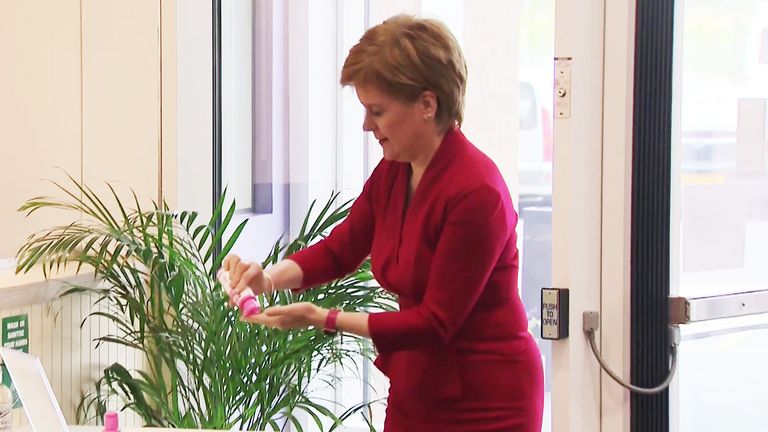Official advice on what hand sanitiser to use against coronavirus was watered down by the government 10 days before lockdown and no longer matches World Health Organisation (WHO) standards.
WHO says hand sanitiser should contain at least 60% alcohol to be effective against COVID-19 and has published tests showing it takes 20 to 30 seconds to kill the virus on hands.
A Sky News investigation has found hundreds of thousands of bottles of alcohol-free hand sanitiser, which take up to two minutes to kill coronavirus, are being used in schools, homes and businesses.
The alcohol-free products are manufactured to European and British standard BS EN 14476, which certifies hand sanitiser as effective against coronavirus if it kills a certain proportion of a similar virus after being mixed with it in a test tube, but is not tested on anyone’s hands.
At the start of the pandemic UK government advice followed the WHO guidance, stating: “Use an alcohol-based hand sanitiser that contains at least 60% alcohol if soap and water are not available.”
But on 13 March that advice was quietly withdrawn, nine days after Health Secretary Matt Hancock said he was “making sure the public knows exactly what they should be doing to keep themselves and others safe”.
Since then advice from Mr Hancock’s department and Public Health England has made no mention of what hand sanitiser should contain.
Dr Katie Maddock, head of Keele University’s School of Pharmacy and Bioengineering, said the government should not have withdrawn its initial advice.
“I think it is very confusing for people,” she said.
“I think if we just choose a track and stick to it, and the alcohol has got the evidence base, that’s where we should be.”
Professor Sally Bloomfield, Chair of the International Scientific Forum on Home Hygiene, an industry-funded NGO, agreed.
“I think we should be sticking to [alcohol hand sanitisers] that have been tested over the years under use conditions and been shown to be effective,” she said.
“I don’t see why we should be prepared to settle for something which has not been tested under use conditions, and I think that is a failing.”
Professor Bloomfield said it was not realistic to expect people to keep wet sanitiser on their hands for two minutes.
“If you’re going into a supermarket you want to make sure your hands are free of any viruses.
“You don’t want to stand outside that supermarket for two minutes waiting for that product to work.”
Confusion about hand sanitisers being sold in the UK left Scotland’s First Minister Nicola Sturgeon inadvertently using a product that does not meet her own government’s requirements.
In a photo opportunity at a West Lothian school to persuade parents it was safe for children to return to school she was twice filmed using alcohol-free hand sanitiser.
Unlike Westminster, the Scottish government says it has kept to the WHO guidance, and its schools should have “hand washing facilities that are adequately stocked or have alcohol-based hand rub at key areas”.
Alcohol-free hand sanitiser is made by several UK companies, including Cleeanol in Oxfordshire, which is producing 75,000 litres every month for sale to schools, businesses and wholesalers.
The company’s ‘Senses’ hand sanitiser passed a BS EN 14476 test that shows it takes two minutes to kill coronavirus.
Managing director Sam Greaves told Sky News: “We have tried to follow as much of the regulations that are available to us, the British standard that we follow, we provided the schools with the relevant information.
“It has been tested to kill coronavirus, it’s safe, it’s soft on hands, it’s good for the children, there’s many benefits there for them and I think the main thing is it works.”
:: Listen to the Daily podcast on Apple Podcasts, Google Podcasts, Spotify, Spreaker
We asked the government for a response but they have not provided one.
The British Standards Institute said in a statement that its test methods “enable a consistent way to evaluate the performance of hygienic hand rubs in a controlled and repeatable way.
“If the product meets the requirements of outcome of the test methodology, a product is deemed to pass. This enables different types of products to be used safely.”
West Lothian Council said the alcohol-free product the first minister was filmed using is no longer in key areas of any of its schools, and said it is complying with Scottish government guidance.

